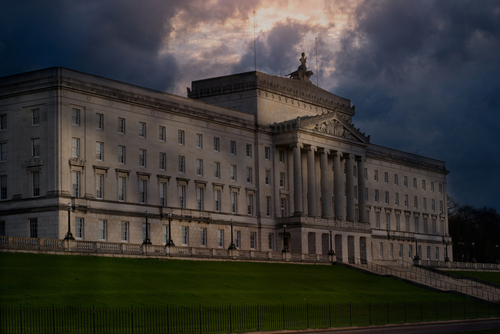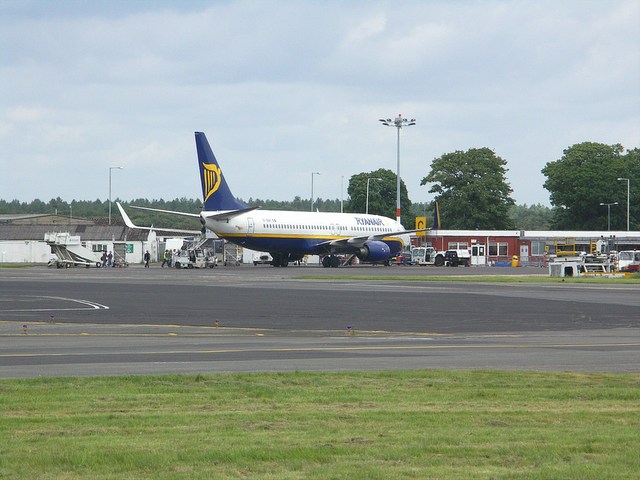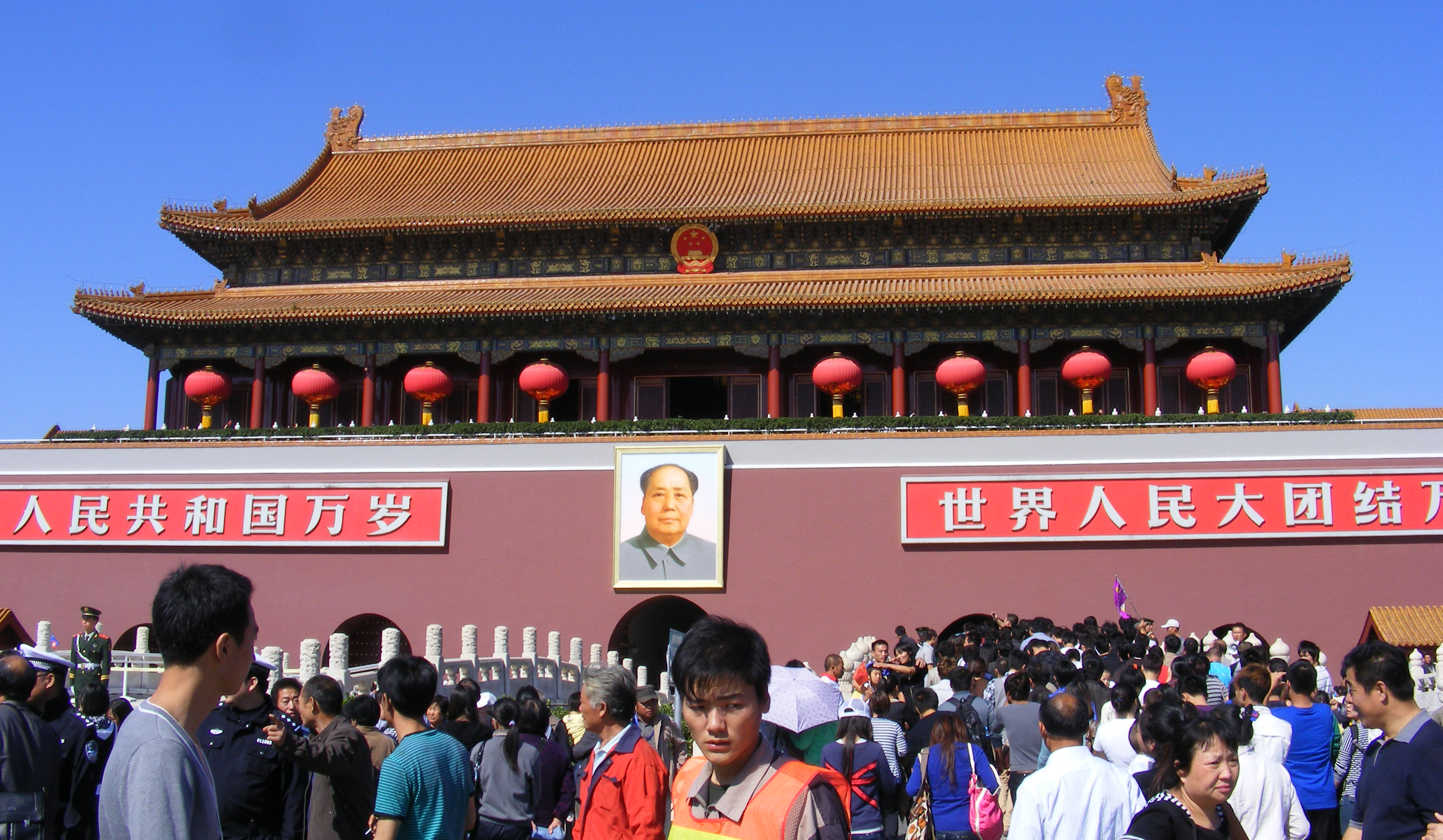100 years after the passing of the Northern Ireland act, fresh turmoil lingers. Brexit and the Northern Ireland protocol has led to questions surrounding Northern Irelands relationship with the UK
The dispute:
May 3rd 1921, The Government of Ireland act (1920) became a bill. Six counties making up the northern bloc of Ireland remained part of the United Kingdom. While the south gained independence later forming a republic – the Republic of Ireland.
May 3rd 2021, Northern Ireland turned 100. At that time, there have been periods of unrest between Unionists and Republicans throughout Ireland. Perhaps most infamously during the Troubles between the 1960s and 1990s. Although the relationship has been more amicable in recent times. The debate around Northern Ireland and its relationship with the UK and its southern counterparts has always lingered. That debate has threatened to reach a fever pitch recently due to Brexit and the controversial Northern Ireland protocol.
Under the current trade deal with the EU, the Northern Ireland protocol would create a sea border between Northern Ireland and the rest of the UK. This would allow for the border ramifications of the 1998 Good Friday agreement to remain in place. So, essentially, goods can move unchecked through the border between the Republic of Ireland and Northern Ireland; but customs will have to check goods sent between Northern Ireland and the UK. The UK has implemented a ‘grace period’. Whereby certain goods can pass unchecked through the sea border for a set period of time. This period, originally set until April 1st, is extended until October 1st. However, the EU has embarked on legal action against the UK. They argue that their easing of border control protocols ‘violates’ international law.
The political response:
The border dispute issue is a double-edged sword. Creating a hard border with the Republic of Ireland would dismay republicans and those who dream of a united Ireland. While contrast, the current compromise is abhorrent to many unionists and loyalists. Loyalists desire the same treatment as the other devolved states in Great Britain – namely Wales and Scotland. Either way, a divide would emerge. The violence is seen over the Easter weekend and onwards was sadly no surprise. In fact, many predicted such unrest. Prominent unionist leader, Peter Robinson, had said, ‘we are perilously close to a line which, when crossed will lock us all into a pattern all two familiar.’
So many loyalists or unionists are unhappy with the Northern Ireland protocol because they deem it to be weakening to the Union. They see it as undermining the relationship between Northern Ireland and the rest of the UK. It is not just the public who feel disenfranchised by the agreement. Incumbent DUP leader and head of the devolved government (Stormont Assembly) in Northern Ireland said the UK was ‘hurting itself’ to favour the EU.
The DUP leader, Arlene Foster, has since announced she will resign later this year. This came after a no-confidence vote. The vote to replace her will be on May 14th. Her resignation comes at an interesting time. As no doubt, the sea border will be a key issue in leadership campaigns. In fact, an Agricultural minister, Edwin Potts, who is one of the two candidates to replace the current DUP leader, has threatened to UK government with legal action over the dispute. Interestingly, the emergence of a leadership challenge from two members of the DUP means it’s the first time such a challenge has occurred in around 50 years – almost a metaphoric actualisation of the divide caused in Ireland following the Northern Ireland protocol.
How people reacted online:
The reactions on Twitter further highlight a divide; they personify it on a human level. One user, Georgina Milne, indicated the apparent mood in Northern Ireland since January 1st. Writing ‘I don’t feel Irish, or like I belong in, or have an
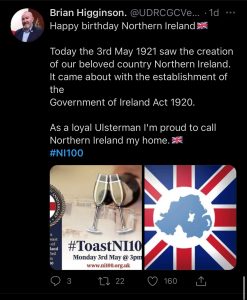
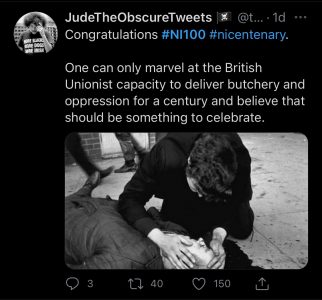
affinity to the Republic of Ireland. I don’t feel British either’. Most other users were clearly more partisan; Brian Higginson, a self-professed unionist, wrote ‘Happy Birthday Northern Ireland[.] Today the 3rd of May 1921 saw the creation of our beloved country Northern Ireland. It came about with the Government of Ireland Act 2020. As a Loyal Ulsterman, I’m proud to call Northern Ireland my home.’ On the other end of the political spectrum, pro-republican account JudeTheObscureTweets, put out a tweet ‘One can only marvel at the British Unionist capacity to delivery butchery and oppression for a century and believe that should be something to celebrate.
Different voices:
In an email interview with David Henig, Director for the UK Trade Policy Project for the European Centre for International Political Economy (ECIPE), he said:
‘Throughout my life, which is just short of half the lifetime of Northern Ireland, the relationship with the UK has always felt complicated. Clearly different in many areas from politics to sport, but also part of the UK. I have never seen the protocol or Brexit as an insurmountable barrier to that continuing, but that is still to be resolved.’
In a direct message interview on Twitter. James Mcllhatton said
‘Currently, I have felt that the British government has left northern Ireland behind. With the independence of Scotland and Wales rising, I could see Northern Ireland re-joining the Republic of Ireland sooner rather than later. I personally am half English on my mother’s side and have numerous friends from the Republic of Ireland, so I want peace for us all and no more fighting or rioting but considering that has unfortunately been a part of Northern Ireland for 20+ years, it’s a dream that I doubt would come true even if Ireland became unified.’
The question now, as the century celebration passes, what is the future for Northern Ireland? The answer is far more complicated than the question, and the worry is that further disenfranchisement could lead to further unrest and violence.





